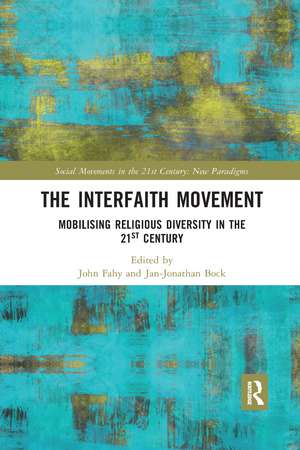The Interfaith Movement: Mobilising Religious Diversity in the 21st Century: Social Movements in the 21st Century: New Paradigms
Editat de John Fahy, Jan-Jonathan Bocken Limba Engleză Paperback – 31 mar 2021
Preț: 385.54 lei
Nou
Puncte Express: 578
Preț estimativ în valută:
73.78€ • 80.12$ • 61.98£
73.78€ • 80.12$ • 61.98£
Carte tipărită la comandă
Livrare economică 23 aprilie-07 mai
Preluare comenzi: 021 569.72.76
Specificații
ISBN-13: 9780367726744
ISBN-10: 0367726742
Pagini: 254
Dimensiuni: 156 x 234 x 18 mm
Greutate: 0.36 kg
Ediția:1
Editura: Taylor & Francis
Colecția Routledge
Seria Social Movements in the 21st Century: New Paradigms
Locul publicării:Oxford, United Kingdom
ISBN-10: 0367726742
Pagini: 254
Dimensiuni: 156 x 234 x 18 mm
Greutate: 0.36 kg
Ediția:1
Editura: Taylor & Francis
Colecția Routledge
Seria Social Movements in the 21st Century: New Paradigms
Locul publicării:Oxford, United Kingdom
Public țintă
Postgraduate and UndergraduateCuprins
1. Introduction: Interfaith and Social Movement Theory 2. Interfaith Political Activism in the United States: Understanding Variation in the Cultural Challenges of Being and Doing Interfaith 3. Faith Embedded and Embodied: Interfaith Collaboration to Address Islamophobia in the United States 4. InterAction Australia: Countering the Politics of Fear with Netpeace 5. Making Space for Faith: Interfaith Initiatives in Denmark 6. Empowerment or Oligarchisation? Interfaith Governance of Religious Diversity in Two German Cities 7. Local Governance of Religious Diversity in Southern Europe: The Role of Interreligious Actors 8. Singapore's Interfaith Landscape: Harmonious Coexistence or Precarious Toleration 9. Beyond Normative Secularity: Politics of Interfaith Dialogue in Lebanon 10. Religious Discourse and Interreligious Impact in Egypt’s "Spring" 11. Transnational Interfaith Diplomacy: The Interfaith G8/G20 Shadow Summits 12. Epilogue: Understanding a Decentralised Social Movement
Notă biografică
John Fahy is an Affiliated Researcher at Georgetown the Woolf Institute, Cambridge. He received his PhD in Social Anthropology from the University of Cambridge, and has published widely on the anthropology of religion, diversity, ethics and interfaith in both India and the Persian Gulf. His first monograph, Becoming Vaishnava in an Ideal Vedic City (Berghahn Books), is forthcoming.
Jan-Jonathan Bock is the Programme Director of Cumberland Lodge, in Windsor Great Park. He received his PhD in Social Anthropology from the University of Cambridge in 2015, and has published in anthropology and social science journals. His research interests include urban life, community cohesion and the challenges of pluralism, which he has explored in Germany, Italy, the UK, the Middle East and South Asia. Jan’s publications include Austerity, Community Action, and the Future of Citizenship in Europe (Bristol Policy Press, 2015, with Shana Cohen and Christina Fuhr), and Refugees Welcome? Difference and Diversity in a Changing Germany (Berghahn Books, 2019, with Sharon Macdonald).
Jan-Jonathan Bock is the Programme Director of Cumberland Lodge, in Windsor Great Park. He received his PhD in Social Anthropology from the University of Cambridge in 2015, and has published in anthropology and social science journals. His research interests include urban life, community cohesion and the challenges of pluralism, which he has explored in Germany, Italy, the UK, the Middle East and South Asia. Jan’s publications include Austerity, Community Action, and the Future of Citizenship in Europe (Bristol Policy Press, 2015, with Shana Cohen and Christina Fuhr), and Refugees Welcome? Difference and Diversity in a Changing Germany (Berghahn Books, 2019, with Sharon Macdonald).
Descriere
This volume explores the history and development of the interfaith movement by engaging with new theoretical perspectives and a diverse range of case studies from around the world, and challenges the longstanding academic division of labour that confines ‘religious’ and ‘social’ movements to separate spheres of inquiry.


